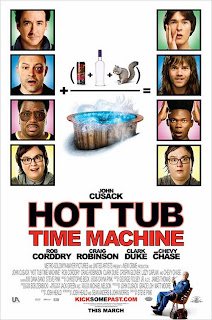 When a movie has a title like Hot Tub Time Machine, reviewing it almost seems futile. Movies like this come down to whether or not you find it funny. Unfortunately, it seems that the movie had most of its jokes ruined by the trailers, so I found myself laughing less than I would have liked to. Sure, there were a few surprises, and the characters were occasionally entertaining, if not a little stock. Still, if you like knowingly dumb comedies, you could do worse than Hot Tub Time Machine.
When a movie has a title like Hot Tub Time Machine, reviewing it almost seems futile. Movies like this come down to whether or not you find it funny. Unfortunately, it seems that the movie had most of its jokes ruined by the trailers, so I found myself laughing less than I would have liked to. Sure, there were a few surprises, and the characters were occasionally entertaining, if not a little stock. Still, if you like knowingly dumb comedies, you could do worse than Hot Tub Time Machine.Do I even need to explain the plot? Four friends get into a hot tub and it takes them back to the 80's. It's the barest of premises, and it serves to give us a lot of riffs on both the 80's and the 00's (Indeed, while there isn't a lot of 10's culture yet established for a film to make fun of, this film seems most comfortable with jokes about things that are more than a few years old, like "Let's Get Retarded" by the Black Eyed Peas). Like any good 80's satire, everything is extremely exaggerated. People all wear ridiculous clothes, love Red Dawn, and listen to the most on the nose 80's songs. The 80's are such an easy target, it can often make for very lazy jokes (what color is Michael Jackson?). It would have been nice to see the film try a little harder. Still, when the jokes do work, they work well. The running joke about Crispin Glover's character is probably the standout.
The cast is strong for this kind of film, even if they have little to do. John Cusack seems so out of place here, and as our de facto lead he is probably the only dull spot. His straight man routine doesn't really provide any real comedy, he is mostly there to comment on what is going on. Craig Robinson and Rob Corddry are, as expected, very reliable. While we've seen the Corddry character a thousand times before - the boorish friend who seems to have no boundaries - Corddry takes the guy to new and outlandish heights. And Clarke Duke, as the youngster of the group, is surprisingly amusing as the only person who seems to be aware of how much damage they could cause to the future. Realizing he was conceived the very weekend they end up in, his neurosis over erasing his birth is very funny. And then there is the cameo by Chevy Chase. Chase seems to be in the midst of a very minor comeback, which is a wonderful thing. Sadly, his talent is squandered here in a borderline non-sequitur performance. He is apparently some sort of time traveling God who only speaks in riddles, but he is so insignificant to the plot and is clearly only there because he is a familiar face.
Your mileage may vary, but I found the film to lack the big laughs and truly memorable characters of something like the similar Hangover. Still, it does have some nifty riffs on time travel, and the callback to the "Johnny Be Good" sequence from Back to the Future is a clever moment that doesn't hit you over the head about being a reference. Again, when you call your film Hot Tub Time Machine, you aren't exactly delving into the intricacies of time travel or the profundity of life.













